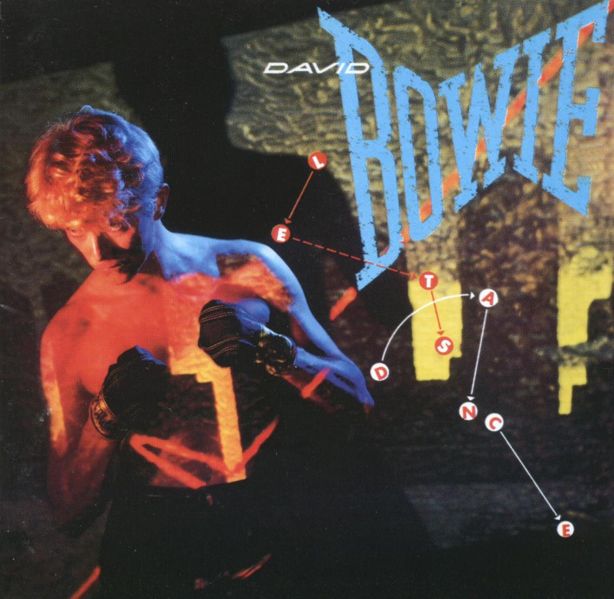We’ve reached the tipping point in my exhaustive, and I hope definitive, guide to all of the great dame’s studio albums. Let’s not be too disingenuous, but from here on in the quality starts to wane, as Bowie wore the mantle of a prancing pop-lite crooner. Yes it must be the 80s, those RCA label days long since discarded for a shot at the top of the pantheon.
Let’s Dance (EMI) 1983
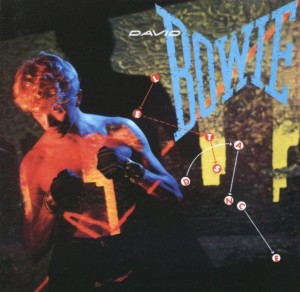
Protesting his innocence, rather too strongly, the $17.5 million dollar-richer Bowie inadvertently struck commercial gold with his 15th studio album. The formative RCA years were replaced with an uneasy transition to EMI, whose pricey acquisition would at least boost the label’s coffers during the mid to late 80s.
Undervalued and inappropriately shafted, Bowie’s long-time collaborator Tony Visconti was dropped at the eleventh hour, in favour of Chic’s Nile Rodgers.
What Rodgers brought to the table was a vibrant, polished, more swaggering sound. MTV friendly and able to rouse the masses to their feet – just listen to the infectious gilding that turned a simple backbeat and Kenny Logan-esque guitar lick into something way beyond pop on ‘Modern Love’.
Apart from a few well-meaning but dawdling numbers, this album was really a collection of potential, and in ‘Cat People’ case, previously successful singles. A jumbled coherence of themes permeate however, as a faux-colonial, abroad in WWII backlit Singapore or Macao, mixed with sharp lemon meringue zoot suit, Bowie launched into a diatribe on racism and oppression. Taking a special interest in the Aborigine’s cause, dedicating the eponymous title track to their struggle.
For every guarded metaphorical attack, there was a counterbalanced slide onto the dance floor – ‘Shake It’, one of the thin white duke’s less challenging but contagious soulful paeans to courtship. Presented as a ‘singers’ album, Bowie concentrated on honing his electric-blues vocal delivery, relinquishing the usual playing duties.
Despite selling six million copies and attracting a new-found audience, he resented the attention and increased pressure, especially as Let’s Dance was at odds with his original intentions. He’d blame Rodgers’ varnished production – though this never stopped them from working together again years later on Black Tie White Noise – for sending him in a commercial, but aridly dry artistic direction. However, it’s an impressive work of spritely charming and neon-glowing pop. Just the opening global hot-steeping trilogy of ‘Modern Love’, ‘China Girl’ and ‘Let’s Dance’ would be enough to justify Bowie’s tumultuous decade alone
Decreed as the leading highlights of the album by the majority –
Modern Love (single), China Girl (single), Let’s Dance (single), Cat People (single)
Pay attention to these often overlooked beauties –
Ricochet, Shake it
Tonight (EMI) 1984
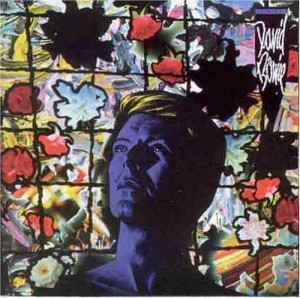
‘Keeping his hand in’ so to speak, Bowie kept up the pop-lit pretence with Tonight. Arriving straight off the back of his Serious Moonlight world tour, and with the very same backing group – including the Borneo horns troupe – the follow-up to his massively successful Let’s Dance showcase was a far patchier affair.
A filled-out, skiing obsessed, pastel shaded crooner, long since divorced from his moiety, Angie, and now in custody of their child Zowie, he was less concerned with previous concepts and play acting and more interested in growing pains and heart-strung romantic indulgence.
Of course every time ‘Davey Jones’ sported new garbs and ventured out on the road, he was always acting a part. But the burgeoning film career, which began with The Man Who Fell To Earth through to his stage roles in Baal and The Elephant Man on Broadway, allowed a new avenue of total immersion for Bowie. Channelled then via celluloid, the previous year alone saw him star as a forlorn ageing vampire in The Hunger, and as the English prisoner-of-war ‘Strafer Jack’ Celliers in Merry Christmas Mr. Lawrence: that exuberant theatrical spirit was missing for the most part from his music.
However, Bowie did get to indulge himself on the ‘Blue Jean’ (perhaps Tonight’s savior from total disaster). Well, the video/mini-movie at least, directed by Julian Temple, and stretched out to twenty-minutes, featured the singer adorned with a makeshift turban and piled-on make-up.
A new production, the largely untested Derek Bramble, and Hugh Padgham tried to mix things up, but instead lost their way as Bowie made a pig’s ear of things. The fact that his knock-about ‘comrade-in-arms’ Iggy Pop pitched in is almost irrelevant, as all the edge is erased by a fuzzy saccharine mush. Using a maudlin calypso, faux-reggae, backing he teams up for countless misfires; duetting with Tina Turner on the dawdling title track (originally sung by Pop on his second solo LP, Lust For Life): ruining all his erstwhile partner’s contributions. ‘God Only Knows’ what he was thinking by covering Brian Wilson’s (lyrics by Tony Asher) beatific masterpiece, and you also have to question the addition of Jerry Leiber and Mike Stoller’s gold standard, ‘I Keep Forgettin’: thrown in as a so-called return to rock’n’roll? Hardly!
Luckily ‘Saving The Alien’ was on hand to at least stop the spread of rot. ‘All the gear and no idea’, Tonight paved the way for Labyrinth, Bowie’s forked tongue and sardonic protestations all but muted so that his crossover, inter-generational appeal could now reach even the youngest sections of society.
Decreed as the leading highlights of the album by the majority –
Loving The Alien (single), Tonight (single), Blue Jean (single)
Pay attention to these often overlooked beauties –
None whatsoever…move along…nothing to see here!
Labyrinth (EMI) 1986
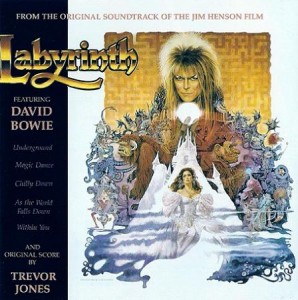
Dressed to kill as the pantomime dame, in a pupated fantasy world, Bowie moons forlornly in the children’s movie. Cast as the archetypal misguided villain, Jareth, our cracked actor fulfills his need to sing and dance from behind another façade.
For those expecting a whimsical affair, the Trevor Jones and Bowie soundtrack is itself full of both mellifluous romantic waltzes and ominous discordance. Of course the South African composer of over fifty films, was used to scoring this sort of picture, having already done Time Bandits and The Dark Crystal. Bowie however offers up some pining laments, capturing the spirit of his conceited but lovelorn goblin king. In fact, though obviously directed at a younger audience, the vocal tracks have an instant commercial allure to a mature market too, tapping into the new fan base, which picked-up on Let’s Dance.
In truth the fun-frolicking joyous ‘Magic Dance’ and gospel backed ‘Underground’ are better than anything off his previous release, Tonight (with the exception of ‘Blue Jean’ and ‘Loving The Alien’).
The slippery chameleon was however ‘losing his edge’, identified as a crooning balladeer in a sharp lapelled suit, devoid of new ideas. The next few years wouldn’t change that opinion.
Decreed as the leading highlights of the album by the majority –
Underground, Magic Dance (single), As The World Falls Down (single)
Pay attention to these often overlooked beauties –
Within You!
Never Let Me Down (EMI) 1987
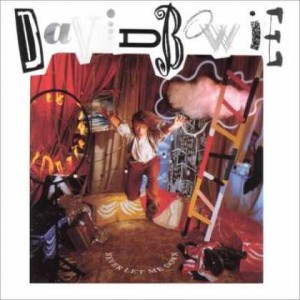
Commercially the 80s had been kind. Bowie’s mega selling behemoths, dubious ‘matched in heaven’ PR duets and Live Aid performance propelled him into the mainstream but consequently took that ‘edge’ away. He knew all of this of course, his remedy a return back to good old rock’n’roll.
Whilst hardly a step back, Never Let Me Down does at least improve upon the ill-starved shower that was Tonight. Squirrelled away in his Montreux retreat, with miscreant bedfellow Iggy Pop and latest sparring partner, Erdal Kizilçay, for company, Bowie dreamt up an elaborate arachnoid concept. Engrossed with a documentary on the black widow spider, and after a few questionable leaps of imagination, the grandiose Glass Spider tour was born. Setting the music to this elaborate stage set would be a stretch, and apart from the macabre narrated synonymous themed track, those spider analogies and metaphors were kept to a bare minimum.
Another pop-lite collection without a cohesive or thematic guiding hand – despite the whole Glass Spider backstory – the album’s amorphous looseness is its advantage. ‘Day-In Day-Out’ is a vast improvement, an almost invigorated, and social commentating Bowie returns to the fold, swooning as he does over a Art Of Noise like production of anvil banging and phaser sharpened 80’s percussion.
Elsewhere there’s Neil Young inspired odes to Chernobyl, on ‘Time Will Crawl’, gentle soliloquy tributes to New York, ‘New York In Love’, and his infamous – and probably very much put upon – personal assistant, Coco Schwab, ‘Never Let Me Down’: Bowie channels the spirit of Double Fantasy era Lennon on that particular paean.
Apart from the risible beat poetic turn from Micky Rourke (an idea that should have been left in the bar room surroundings where it was conceived) on ‘Shining Star’, most of the material is convincingly Bowie. Though the bunting wasn’t yet ready to be draped across the town halls and streets, as Tin Machine was lurking on the horizon.
Decreed as the leading highlights of the album by the majority –
Day –In Day-Out (single), Never Let Me Down (single), Zeroes
Pay attention to these often overlooked beauties –
Beat Of Your Drum, 87 And Cry
Tin Machine (EMI) 1989
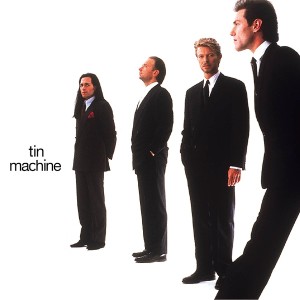
Bowie’s mid-life crisis, omitted from flings and fast cars, was the ill-advised Tin Machine. Hoping to be absorbed into a band set-up, with the focus shared by all four of its’ members, the thin white duke’s most questionable phase was simply an uncomfortable experience for all involved.
Artistically at an all-time low, Bowie sought solace with his ‘therapy group’, attracted by the common denominator that his new chums were also all divorcees – jokingly, The Four Divorcees and Alimony Inc. were bandied around as possible band appellations.
A democratise unit, Bowie, Reeves Gabrels and siblings, Tony and Hunt Sales (fifth collaborative member, Erdal Kizilçay, declined joining the band) envisioned a care-free rock’n’roll aesthetic, free from the synthesised electronic production that so dominated the 80’s music scene.
Essentially a throwback, the ‘boom bap’ drum backing and squealing hard-rock guitars stripped away all artistic vestiges for a ragged, spontaneous jumble of Chicago blues, moribund soul and lumbering rock – inspired by a choice The Pixes, Cream, Mingus and Gene Kupa influences.
Recorded between L.A, Montreal, Switzerland and Nassau, the last of these misjudged locations added some protestation to a weak album: the seedier side of their Bahamas Island retreat denounced with ‘Crack City’.
To be expected, Tin Machine only shine when they gravitate towards archetypal Bowie, which doesn’t happen often, even though he’s still out front on lead vocals and back playing guitar again, despite his apparent reluctance.
Standouts, for all the wrong reasons, include an indulgent take on John Lennon’s ‘Working Class Hero’, romantic sniffle ‘Prisoner Of Love’, and pretentious manifesto blast ‘Under The God’. Thankfully the second, and last, Tin pot album would be a huge improvement.
Decreed as the leading highlights of the album by the majority –
Heaven’s In Here (single), Tin Machine (single)
Pay attention to these often overlooked beauties –
Are you serious?
Tin Machine II (Victory Music) 1991
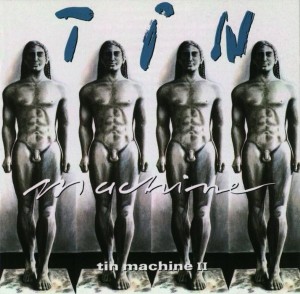
Exasperated with their ‘golden calf’, EMI finally capitulated, casting the reticent Tin (pot) Machine adrift. Eager as they were to record a follow-up – the first not exactly a winner – the band had to wait whilst their contractually obliged leading man went out on the road with his solo ‘Sound + Vision’ tour of 1990/91.
Despite assurances by Bowie that he was dedicated to his new found freedom as just an anonymous member of the band, Tin Machine II would be a conclusive swansong, ending the three-year project on a reasonable high, though Bowie was adamant that he would return for a third LP the following year after recording his first solo project in years, Black Tie White Noise.
More melodic but hardened by a industrial ‘shard of glass’ snarling lick of guitar and imbued by Bowie’s latest appropriation, Nine Inch Nails, Tin Machine created a maelstrom of pretentious, but competent pretentious, blues rock.
This isn’t to say that they’ve stepped on the accelerator, in fact, rather the opposite, or as Bowie would gush: “We were screaming at the world before, now just in love.”
Clichéd track titles aside the mix of belters and soul searching laments shows a greater diversity: perhaps as a consequence of signing to the less manipulative and controlling Victory Records. The odd song even recalls the burgeoning days of Space Oddity, with the dreamy, jangled acoustic ‘Amlapura’.
Relinquishing lead vocal duties on a couple of the tracks, Bowie spurs his partners to croon in a doo wop fashion, on the sultry nightclub swinging ‘Stateside’, and weep in anguish on the pained Stevie Winwood-esque ‘Sorry’.
Granted it’s obviously not on a par with Bowie the polymath, chameleon of pop’s, solo work yet it did at least allow the frustrated artist an opportunity to fail without totally fucking up his career.
Fizzling out unceremoniously in 1992, the ‘just one of the boys’ experiment did at least set-up a mutually constructive working relationship between the singer and his Fripp-esque lead guitarist, Reeves Gabrels. The two would work together again on the triumvirate of albums, 1.Outside, Earthling and Hours.
Decreed as the leading highlights of the album by the majority –
Baby Universe (single), One Shot (single), You Belong To Rock n’ Roll (single)
Pay attention to these often overlooked beauties –
Shopping For Girls
Black Tie White Noise (Arista BMG) 1993
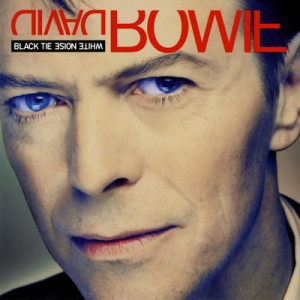
Bowie the glowing groom was above the trivial of platitude wedding vowels and practising special moves for the couple’s signature last dance. For his marriage to Iman Abdulmajid, he composed a typically nuanced musical suite, in lovesick tribute.
Part of this ceremonial accompaniment (the opening moiety of ‘The Wedding’ and bookended, ‘The Wedding Song’) was integrated, in to what would be, his heralded solo comeback LP, Black Tie White Noise.
Meant as a representation of two entwined cultures, the vaguely eastern romantic saxophone and western backbeat were used as a leitmotif: seeping into a fair share of the album’s twelve tracks. Tied-in with a return to a city that had dominated his songbook with themes of isolation and drug addiction (from Young Americans to Lodger), L.A, would settle for Bowie’s take on the race issues of the day. Jetting in as the whole Rodney King episode sparked off an apocalyptic raging inferno, Bowie both scared and exhilarated, breathed in the toxic air for inspiration.
Eager to refrain from sounding too glib, he wrote the album’s title track as a counterbalance to the grinning, smug optimism found on the ‘united colours of Benetton’ billboards. Angling his wit at the ethnocentric MOR, Bowie himself liberally drops in slogans and motifs from Marvin Gaye, faux-reggae and New Jack Swing, as he duets with one of the scene’s passing stars, Al B Sure!
Mixing it up in the ‘ghetto’, Bowie once again ropes in Niles Rodgers to add some funky gristle and sheen to the jazzy, soulful template. He also took notes from Miles Davis’s late 80s/early 90s adoption of street sounds and be bop; bringing in the revered former Art Ensemble of Chicago’s trumpet player, Lester Bowie, to blow the sort of signature-plaintive squeals and trapped bumble bee solos commonly found in Davis’s repertoire.
The influence works both ways of course, but the omnipresent Scott Walker has always forced Bowie to…well, improve himself. Not so much a competition – Bowie would never quite reach the stripped avant-garde morose of his American rival – the two artists nevertheless spur each other on. Paying back a favour, Bowie covers Walker’s 1978, traversing grown-up, ‘Nite Flights’ (attributed to The Walker Brothers, their last album together as a reformed trio), aping but doing it justice. Whether intentionally imbued by the Walker spirit, the original intended Tin Machine song, ‘You’ve Been Around’ (written with Reeves Gabrels) sounds even more like one of his than Nite Flights.
Former glorious foil, Mick Ronson is heard on the placid, smooth, cover of Cream’s ‘I Feel Free’ (instigated as a result of Ronson’s work on Morrissey’s Your Arsenal) and illusionary rich, autobiographical ‘Jump They Say’: the first time Bowie addresses his half-brother Terry’s suicide in the 80s, by equating his own metaphorical artistic leap.
The odd ‘pop-lite’ tune, Caribbean warbling karaoke ditty (‘Don’t Let Me Down & Down’) and garish, over-egged, rendition of Morrissey’s ‘I Know It’s Going To Happen Someday’ threw spanners into the works, yet Black Tie White Noise pointed towards a wider Bowie renaissance, as it triggered an impending tenure of solid, experimental releases.
Decreed as the leading highlights of the album by the majority –
Black Tie White Noise (single), Jump They Say (single), Miracle Goodnight (single)
Pay attention to these often overlooked beauties –
The Wedding, Nite Flights

